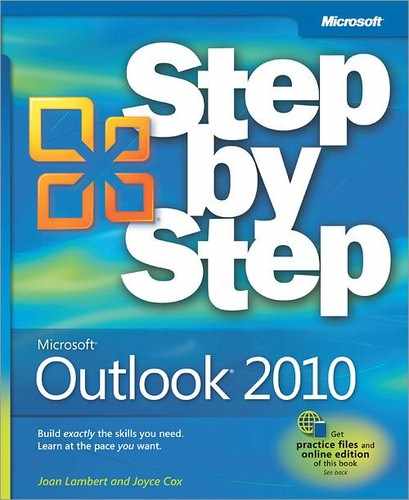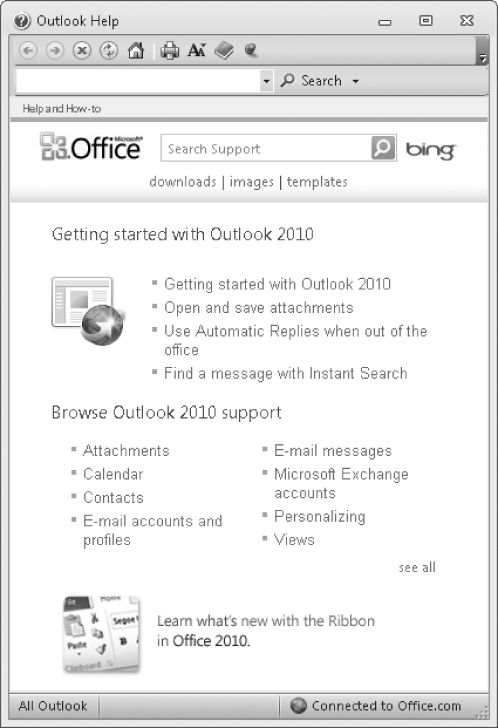Every effort has been made to ensure the accuracy of this book. If you do run into problems, please contact the sources listed in the following sections.
If your question or issue concerns the content of this book or its practice files, please first consult the book's errata page, which can be accessed at:
go.microsoft.com/FWLink/?Linkid=192151
This page provides information about known errors and corrections to the book. If you do not find your answer on the errata page, send your question or comment to Microsoft Press Technical Support at:
If your question is about Microsoft Outlook 2010, and not about the content of this book, your first recourse is the Outlook Help system. This system is a combination of tools and files stored on your computer when you installed Outlook and, if your computer is connected to the Internet, information available from the Microsoft Office Online Web site. You can find general or specific Help information in the following ways:
To find out about an item on the screen, you can display a ScreenTip. For example, to display a ScreenTip for a button, point to the button without clicking it. The ScreenTip gives the button's name, the associated keyboard shortcut if there is one, and unless you specify otherwise, a description of what the button does when you click it.
In the Outlook program window, you can click the Microsoft Outlook Help button (a question mark in a blue circle) at the right end of the ribbon to display the Outlook Help window.
After opening a dialog box, you can click the Help button (also a question mark) at the right end of the dialog box title bar to display the Outlook Help window. Sometimes, topics related to the functions of that dialog box are already identified in the window.
To practice getting help, you can work through the following exercise.
Note
SET UP You don't need any practice files to complete this exercise. Start Outlook, and then follow the steps.
 At the right end of the ribbon, click the
Microsoft Outlook Help button.
At the right end of the ribbon, click the
Microsoft Outlook Help button.The Outlook Help window opens.
Below the bulleted list under Browse Outlook 2010 support, click see all.
The window changes to display a list of Outlook 2010 help and how-to topics.
In the list of topics, click Activating Outlook.
Outlook Help displays a list of topics related to activating Microsoft Office programs. You can click any topic to display the corresponding information.
 On the toolbar, click the Show Table of Contents button, and then
scroll down the pane that appears on the left.
On the toolbar, click the Show Table of Contents button, and then
scroll down the pane that appears on the left.Like the table of contents in a book, the Help table of contents is organized in sections. If you're connected to the Internet, Outlook displays sections, topics, and training available from the Office Online Web site as well as those stored on your computer.

 In the Table of
Contents pane, click a few sections and topics. Then click
the Back and Forward buttons to move among the topics you
have already viewed.
In the Table of
Contents pane, click a few sections and topics. Then click
the Back and Forward buttons to move among the topics you
have already viewed. At the right end of the Table of Contents pane title bar, click the
Close button.
At the right end of the Table of Contents pane title bar, click the
Close button.At the top of the Outlook Help window, click the Search box, type saving, and then press the Enter key.
The Outlook Help window displays topics related to the word you typed.
In the results list, click the Save or don't save drafts of unsent e-mail messages topic.
The selected topic appears in the Outlook Help window.
Below the title at the top of the topic, click Show All.
Outlook displays any hidden auxiliary information available in the topic and changes the Show All button to Hide All. You can jump to related information by clicking hyperlinks identified by blue text.
If your question is about Outlook 2010 or another Microsoft software product and you cannot find the answer in the product's Help system, please search the appropriate product solution center or the Microsoft Knowledge Base at:
In the United States, Microsoft software product support issues not covered by the Microsoft Knowledge Base are addressed by Microsoft Product Support Services. Location-specific software support options are available from:



